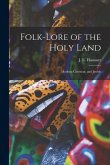"Santal Folk Tales" is a collection of folk tales from the Santal tribe, a group of indigenous people from India, Bangladesh, and Nepal. The book is authored by A. Campbell, who was a British colonial administrator and ethnographer in India during the late 19th century. This book contains over 40 stories, each showcasing the rich cultural heritage and beliefs of the Santal community. These stories revolve around themes such as love, morality, trickery, and the supernatural, often featuring animals and spirits as central characters. Campbell's writing provides insightful commentary on the cultural significance and origins of each tale, along with detailed descriptions of Santal customs and beliefs. The book offers a fascinating glimpse into the unique world of the Santal tribe and their folklore.
Hinweis: Dieser Artikel kann nur an eine deutsche Lieferadresse ausgeliefert werden.
Hinweis: Dieser Artikel kann nur an eine deutsche Lieferadresse ausgeliefert werden.








